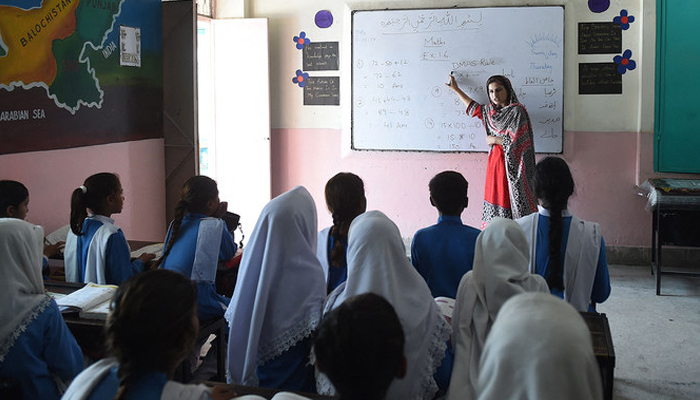Cutting educational expenses through novel methodologies
Islamabad:As continuously increasing education expenditures were reaching beyond parents capacity, experts believe that modern and novel teaching methodology could be one of panacea to address this issue.
In a tug of war between the parents and owners of private educational institutions, either the students miss the opportunities of quality education or the lives of their parents become miserable. The owners, despite earning significant profit, are often seen complaining of extra expenditures in running their institutions due to the price hike of essentials.
If, for a moment, their claims were accepted, there could have been no justification for them to continue with this business if there was no profit. But they go with it, and the easy way to recover their expenditures is to shift the burden to parents through an increase in fees.
Therefore, educational experts have come up with the notion of adopting proper planning, the use of the latest technologies, and a systematic approach to reducing education costs at schools. For them, it might initially seem counterintuitive to invest in new technology. However, choosing the right software and tools can reduce the need for working capital and minimize the use of material resources.
“In many cases, private institutions are charging hefty amounts, and the government should actively engage with them to get fee structures rationalized,” remarked former Vice Chancellor Allama Iqbal Open University (AIOU) Dr. Shahid Siddiqui.
When they are earning millions of rupees, the chargeable amount is becoming unbearable even for middle-class parents, while kids of poor people cannot even think of studying at these institutions. The government and the owners of private institutions should sit together and think out a way forward to address this issue,” he added.
He pleaded in favor of the idea of distant learning through the latest online techniques and said, “It will make us technologically efficient and help save money.” Dr. Siddiqui said different schools use bulk paper to maintain records of teachers and students and prepare reports, timetables, syllabuses, and much more. “Imagine how much money is spent on maintaining this physical record. But, by going paperless and moving databases to the cloud, they can cut down on a sizeable amount of money.”
He regretted that non-formal education had been a deprived area since 1974, as after AIOU, only Virtual University was established to provide distant education. Virtual or distant learning is an easy source for students to access quality education on lesser fees than to physically approach the educational institutions.
Then there is another dilemma of the number of books and notebooks, he mentioned and said, it is unkindness to our babies, seen carrying kilos of books on their backs. "Why do we overload our primary-level students with books and notebooks?" he stated.
Can’t we reduce the number of books and shift them to the latest modes of learning in this era of the latest technologies?" He said the formal universities are converting to an online system, which will surely reduce the cost of education. Keeping in view the hardships of parents, Vice Chancellor Islamia University Bahawalpur, Prof. Dr. Muhammad Ali, came up with the idea of amending the laws and creating a corporate cluster by using the physical assets of education departments to earn money and provide cheaper education to students.
-
 Bad Bunny Faces Major Rumour About Personal Life Ahead Of Super Bowl Performance
Bad Bunny Faces Major Rumour About Personal Life Ahead Of Super Bowl Performance -
 Sarah Ferguson’s Links To Jeffrey Epstein Get More Entangled As Expert Talks Of A Testimony Call
Sarah Ferguson’s Links To Jeffrey Epstein Get More Entangled As Expert Talks Of A Testimony Call -
 France Opens Probe Against Former Minister Lang After Epstein File Dump
France Opens Probe Against Former Minister Lang After Epstein File Dump -
 Last Part Of Lil Jon Statement On Son's Death Melts Hearts, Police Suggest Mental Health Issues
Last Part Of Lil Jon Statement On Son's Death Melts Hearts, Police Suggest Mental Health Issues -
 Leonardo DiCaprio's Girlfriend Vittoria Ceretti Given 'greatest Honor Of Her Life'
Leonardo DiCaprio's Girlfriend Vittoria Ceretti Given 'greatest Honor Of Her Life' -
 Beatrice, Eugenie’s Reaction Comes Out After Epstein Files Expose Their Personal Lives Even More
Beatrice, Eugenie’s Reaction Comes Out After Epstein Files Expose Their Personal Lives Even More -
 Will Smith Couldn't Make This Dog Part Of His Family: Here's Why
Will Smith Couldn't Make This Dog Part Of His Family: Here's Why -
 Kylie Jenner In Full Nesting Mode With Timothee Chalamet: ‘Pregnancy No Surprise Now’
Kylie Jenner In Full Nesting Mode With Timothee Chalamet: ‘Pregnancy No Surprise Now’ -
 Laura Dern Reflects On Being Rejected Due To Something She Can't Help
Laura Dern Reflects On Being Rejected Due To Something She Can't Help -
 HBO Axed Naomi Watts's 'Game Of Thrones' Sequel For This Reason
HBO Axed Naomi Watts's 'Game Of Thrones' Sequel For This Reason -
 King Charles' Sandringham Estate Gets 'public Safety Message' After Andrew Move
King Charles' Sandringham Estate Gets 'public Safety Message' After Andrew Move -
 Lewis Capaldi Sends Taylor Swift Sweet Message After 'Opalite' Video Role
Lewis Capaldi Sends Taylor Swift Sweet Message After 'Opalite' Video Role -
 Brooklyn Beckham Plunges Victoria, David Beckham Into Marital Woes: ‘They’re Exhausted As It Seeps Into Marriage
Brooklyn Beckham Plunges Victoria, David Beckham Into Marital Woes: ‘They’re Exhausted As It Seeps Into Marriage -
 Sarah Ferguson Joins Andrew In ‘forcing’ Their Daughters Hand: ‘She Can Lose Everything’
Sarah Ferguson Joins Andrew In ‘forcing’ Their Daughters Hand: ‘She Can Lose Everything’ -
 'Bridgerton' Author Reveals If Actors Will Be Recast In Future Seasons
'Bridgerton' Author Reveals If Actors Will Be Recast In Future Seasons -
 50 Cent Super Bowl Ad Goes Viral
50 Cent Super Bowl Ad Goes Viral




